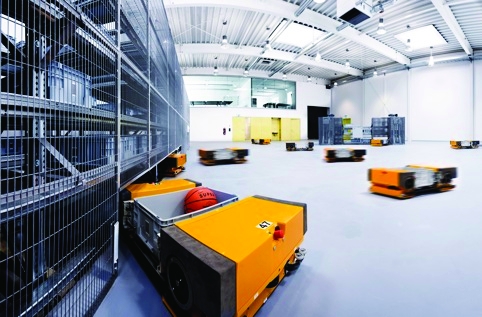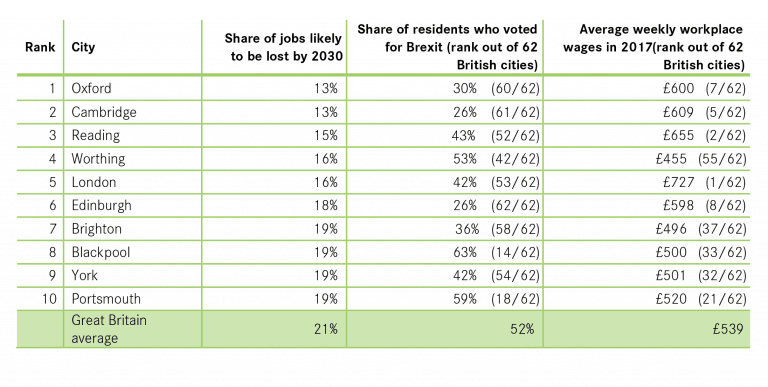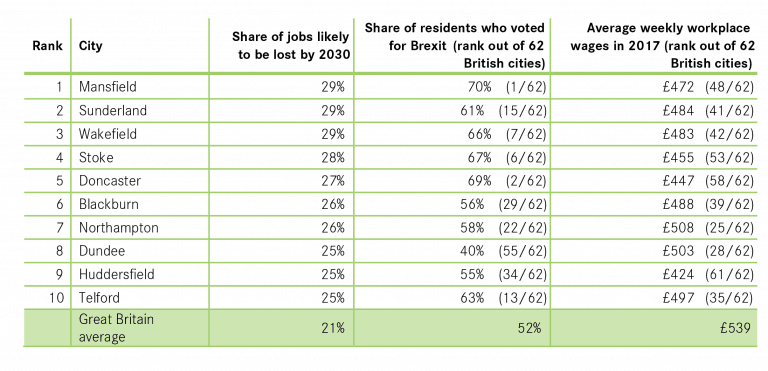
Centre for Cities’ Cities Outlook 2018 – an annual review of UK city economies - focused this year on the potential impact of automation and globalisation in driving job growth and losses.
The report predicts that a fifth of existing jobs in British cities are likely to be displaced by 2030 as a result of automation and globalisation – amounting to 3.6m jobs in total – with retail occupations, customer service roles and warehouse jobs under threat.
Cities in the North and Midlands are more exposed to job losses than wealthier cities in the South, where around 18 per cent of jobs are under threat compared to 23 per cent in cities elsewhere in the country.
The report raises concerns that automation and globalisation will magnify the political dissatisfaction and divisions highlighted by the outcome of the EU referendum in 2016, with many cities most at risk of losing jobs also among those which voted for Brexit.
According to the report, Mansfield is home to the highest share of jobs likely to decline of any UK city, and also had the largest proportion of residents who voted in favour of leaving the EU.
The cities with the lowest share of jobs at risk are predominantly affluent areas in the South of England, which voted to remain in the EU.
Concerns surrounding economic and political divisions across the country are further compounded by Cities Outlook 2018’s findings on jobs growth likely to result from automation and globalisation.
It shows that all cities will benefit from jobs growth brought about by these changes, but jobs in Northern and Midlands cities will largely be in low skilled occupations, while Southern cities are more likely to attract high skilled roles.
Around 1.4m existing jobs in British cities are in occupations predicted to grow by 2030. Between 5-10 per cent of jobs in all British cities today are in occupations predicted to grow in future (except for Oxford, Cambridge and Brighton, where the share of jobs expected to increase is higher). Moreover, the emergence of new industries will bring new jobs which do not currently exist.
In the South, the cities least exposed to losing jobs are also home to larger shares of high skilled private sector occupations which are expected to grow by 2030. Nearly half of jobs predicted to increase in Cambridge – and a third of those in Oxford and Aldershot – are in high skilled private sector occupations. The large numbers of high skilled private sector jobs in these cities will also help them to attract more jobs in new industries and occupations which emerge in the future.

By contrast, cities in the North and Midlands are more likely to see growth in low skilled private sector jobs. Only 1 in 10 jobs predicted to grow by 2030 in cities such as Mansfield, Blackburn and Sunderland are in high skilled private sector occupations, while 3 out of 10 are in low skilled private sector occupations.

Andrew Carter, chief executive of Centre for Cities, said: “Automation and globalisation will bring huge opportunities to increase prosperity and jobs, but there is also a real risk that many people and places will lose out. The time to act is now – national and local leaders need to ensure that people in cities across the North and Midlands can share in the benefits these changes could offer.
“That means reforming the education system to give young people the cognitive and interpersonal skills they need to thrive in the future, and improving school standards. We also need greater investment in lifelong learning and technical education.
“In an ever more divided country, it’s increasingly clear that a one-size-fits-all approach from central government is inadequate to address the myriad issues that different places face. The challenges and opportunities ahead for Blackburn are very different to those for Brighton. The government needs to give cities more powers and resources to tackle the issues that automation and globalisation will present.”




Swiss geoengineering start-up targets methane removal
Several rather dubious statistics in this report. IF methane had 120× the thermal effect of CO2 that would be TWO orders of magnitude. Two is not...